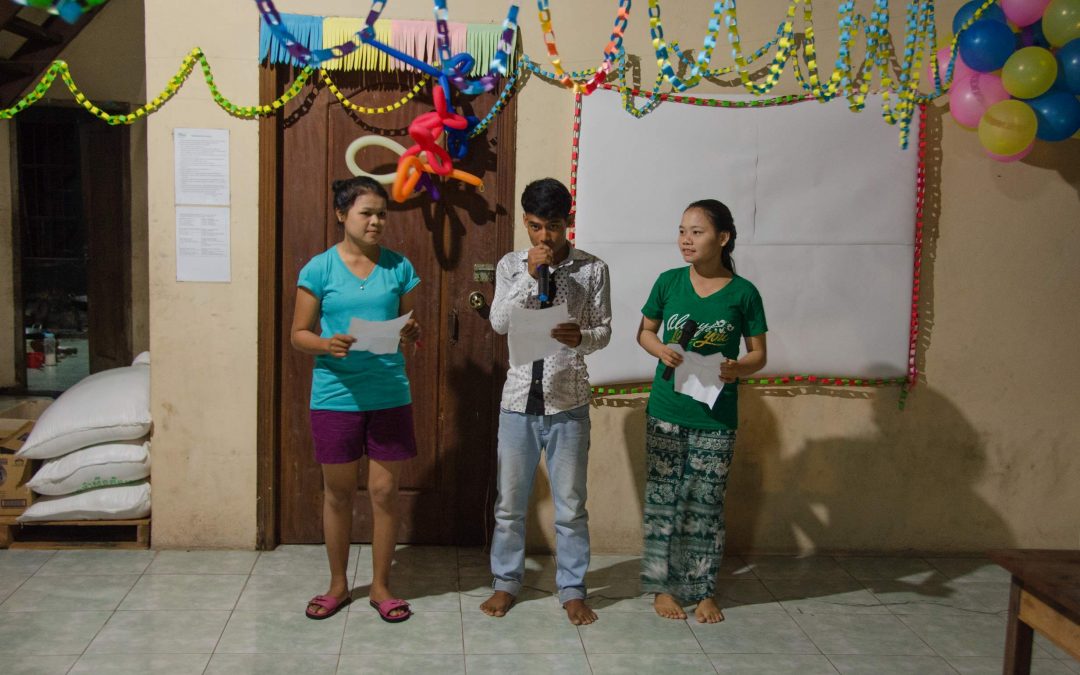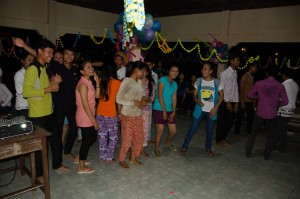Over the past three months, our intrepid Writing Through Facilitator, Katy Oglethorpe, traveled – first with me (Sue Guiney) and then, for most of the time, on her own – throughout the northwest of Cambodia, delivering our workshops to the children in the most remote areas serviced by our partner, Enfants du Mekong/Children of the Mekong. Here below is Katy’s final report and blog post. It speaks for itself, and most eloquently. Thank you, Katy!!
Writing Through Cambodia – A retrospective
For three months this year I had the privilege of leading Writing Through workshops in Cambodia, teaching children sponsored by Enfants du Mekong (EDM) how to write poems and stories in English.
Fifty lessons, hundreds of poems and stories and six “Big Events” later, almost 200 children have received a ‘magic pencil’ and with it the new experience of writing creatively in English.
The workshop represented a lot of firsts. It marked one of the first large-scale projects funded by Children of the Mekong – the UK division of EDM. It was Writing Through’s largest roll-out so far, and one of the first times founder Sue Guiney handed over the reins to her carefully devised workshops. As for me, it was my first formal experience of teaching, and my first time in SE Asia.
The biggest first of all was for the students. Answering a questionnaire before the workshop started, almost half of them said they had never written a story before, whether in Khmer or a foreign language. Just 28 per cent said they felt they “had something important to say” and only 17 per cent said they “felt confident” before the workshop started.
Their reservations were understandable. The workshop, which includes group work, speaking in front of the class, creativity and spontaneity, differs from the typical Cambodian education style which relies on rote learning and places a high importance on respecting the teacher, rather than freedom of expression.
Added to this, reading for pleasure is not common in Cambodia. The national literacy rate is around 73 per cent, and even lower in the poorer, rural areas where EDM’s sponsored children come from. On bumpy bus rides between EDM centres in Bantaey Chhmar, Sisophon, Samrong and Preah Vihear, I did not once see someone reading a book, or even a newspaper.
This context can make teaching a challenge. Tell a group of English, French or American seven-year olds to write a story about anything they want, and most of them will start scribbling away. Asking a group of 12, 15 or 21-year olds they are about to do the same, and I was met with many blank, or plainly terrified, faces.
Here is where the careful structure of Writing Through comes into its own. Through brainstorms, group discussions and visual prompts, the students are gently nudged towards writing for themselves. As in any classroom, confidence, ability and enthusiasm varied across the children, but by writing first as a class and then individually or in small groups, students were able to learn at their own pace.
The theme of each workshop was “Taking Risks”. Before each session, I showed the class photographs. Some showed physical risks: a woman climbing a mountain; a girl who had fallen off her bicycle; a man smoking a cigarette.
Some were emotional or intellectual; and harder for some of the students to identify as ‘risks’. In many cases, these inspired the most interesting work – an image of a boy crying on his friend’s shoulder led to discussions about emotional risk and how the students dealt with their problems. A picture of a Khmer couple on their wedding day prompted initial exclamations of Sah Aht Na! or “Beautiful!”, but often produced discussions about arguments, poverty and even alcoholism and violence.
The students I taught ranged both in their ages and their abilities. So did what they wrote about. For younger children, talking animals and ghosts in the forests were perennial favourites. University students in Battambang wrote an impressive anti-smoking poem, including the catchy line: “When we smoke, we choke”. Traffic accidents remained a constant (and quite understandable) theme across groups.
The capacity for conceptual thought also varied. In Preah Vihear, EDM’s newest centre, the Grade 11 and 12 students were shy about speaking out in class and tended to base their stories and poems resolutely within their own province, often in their high school. In Sisophon, EDM’s longest-standing Cambodian centre, the confidence and ability of the students were more developed. My final groups wrote sophisticated, Bollywood-inspired stories featuring poison, disguise, revenge and romance across enemy lines. For them, several years learning in EDM had made an obvious difference, as had regular film screenings and a well-stocked library. I am confident that within a few years the students of Prear Vihear could be at the same level.
In every centre I was particularly touched by the student’s enthusiasm for learning English and their apparently boundless curiosity about England and my life there. They were surprised that I did not live with my parents, concerned that I did not usually eat rice every day (or even every week), and were shocked that, unlike them, I did not consider 6am to be a lie in, and in fact would have happily slept until 1pm when I was their age.
In turn, they told me about their siblings, families, ambitions, favourite foods. The boys sang mournful warbling Khmer songs after dinner, hand on heart, while their friends sat with their heads bowed. I mastered my own interpretations of both Let it Go and My Heart Will Go On, and came dangerously close to believing that my singing was as Sat Aht Na! as they claimed it was.
One girl, Sali, a Grade 10 student in Sisophon, told me that she was one of seven brothers and sisters. Her youngest brother was “too lazy” to go to school, she told me, with the classic distain of the older sibling. Her oldest siblings were working in factories or at home with babies. Her 17-year-old brother wanted to continue to learn but had no bicycle with which to travel the 20 km to the nearest High School.
As the only one in school, her working siblings sent money to help with her education. She laughed as she told me that that is why she was the first to go to bed in her dorm, and why she always missed the centre’s film screening on Sunday so she could study. She brought out library books she was reading in English to show me and we talked about our favourite characters in Harry Potter. She told me her aim was to learn “all the languages”.
In some ways, Sali’s knack with languages (she is also doing well at French) and her willingness for swapping Bollywood for biology make an exceptional student. But, time and time again, I was struck by how seriously the students took their education, how welcoming they were of me and how receptive they were to learning. It frustrates me that there are those like Sali, living in villages in Cambodia, that could be bursting with the same creativity, academic potential and willingness to study, but are not given the same chance.
At the end of each Writing Through workshop, the children read out their work to an audience. This often took on a party atmosphere; in Samrong we had a traditional Khmer band, in Preah Vihear we spent the afternoon making decorations and there was singing and dancing afterwards. In every centre, there was an abundance of quite disgusting durian-flavoured biscuits. Each child received a magazine with the work produced during the workshop, complete with illustrations drawn by the children and some photographs of our time together.
Asked to evaluate the workshop afterwards, 89 per cent said they planned to write stories and poems by themselves and 88 per cent said they would now feel more confident going to their English lessons. Nearly every child said they would like to participate in the workshop next year. Asked if they had anything else to add, one student in Preah Vihear wrote: “The workshop helps us to have self-confidence. We learn to be brave, to persevere and to write. We think that things are difficult but after we realise that we can do it.”
There is a certain Khmer art to telling the listener what he or she wants to hear. In the space of a week, I saw each child progress in confidence and ability, whether by a small or large amount. For some, I think our week together will be the start of them using writing to express their thoughts and ideas. For others, I hope the workshop has opened up new ways of thinking about the world and has taught them that learning English can be inventive and fun.
As the workshop drew to a close, it was clear that Sue’s theme of “Taking Risks” was a very pertinent one. It is a risk for an NGO to prioritise a programme that teaches poetry and stories; whose focuses on confidence and conceptual thought are subtle and difficult to measure. It is a risk for these children to express themselves in a language that is foreign and in a style that is unfamiliar. To think in new ways; to stand up and share their work; to write.
I believe it is a risk that has, and will continue to, pay off.
I thought it would be fitting to end with a short poem, written by Sompha, Hom, In Chhorm and Sith, Grade 10 students in Samrong centre.
Workshop with Katy
Today we are very happy
Because we study with
Teacher Katy about poems
And short stories
The first time we feel afraid and
Have difficulties with this
Now we don’t feel afraid about learning
Because we have no problem
We can write
A short story and poem
And then we can read
For our friends
And each other
And everybody
Listens to us
We hope that
We can be successful!



Recent Comments